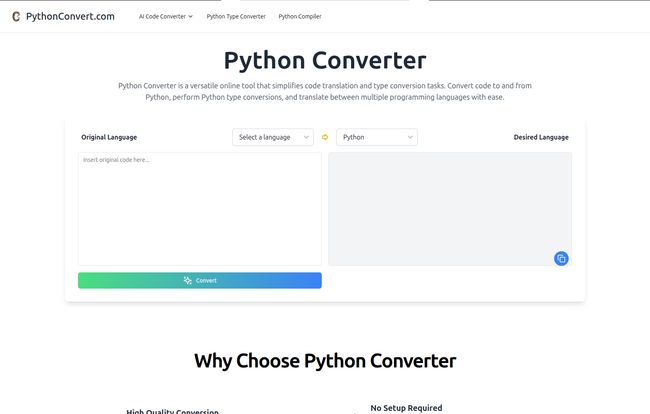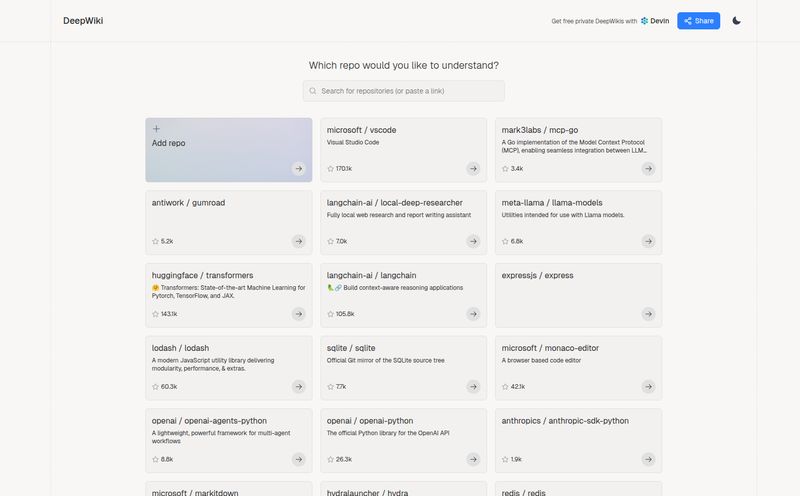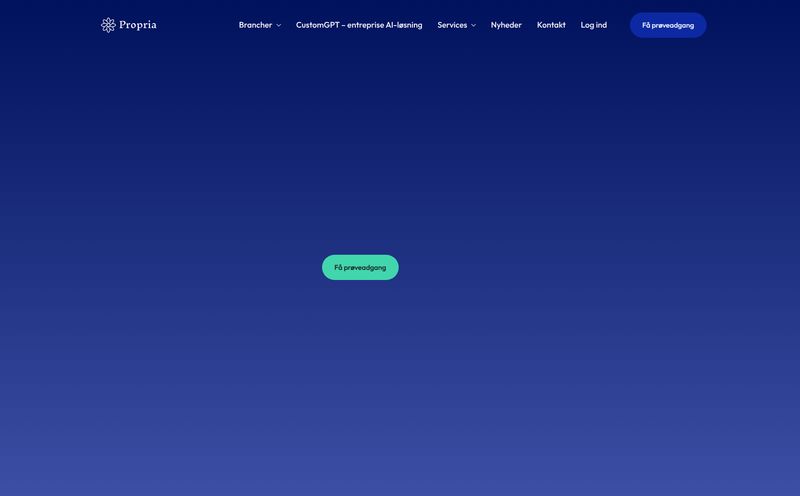If you’ve been in the development world for more than a hot minute, you’ve felt the pain. That sinking feeling when a client says, “This Python script is great, but can we get it in JavaScript? By tomorrow?” It’s a moment that can make even the most seasoned coder want to throw their mechanical keyboard out the window.
For years, this meant a painstaking, line-by-line manual translation, fueled by coffee and a dozen Stack Overflow tabs. It’s tedious, it's error-prone, and frankly, it's a colossal waste of brainpower. So, when a tool like Python Converter pops up on my radar promising to do the heavy lifting with AI, my first reaction is always a healthy dose of skepticism. I've seen a million of these tools. Most are clunky, inaccurate, or want a frightening monthly subscription. But I decided to give this one a fair shake. And I’m… actually kind of impressed.
So, What is this Python Converter Thing Anyway?
In a nutshell, Python Converter is a browser-based tool that uses AI to translate code from one language to another. Its specialty, as the name suggests, is anything involving Python. You can convert a Python script to Java, C++, or a handful of others, or do the reverse. No downloads, no installations, no `pip install` commands that mysteriously fail. You just go to the website, paste your code, pick your languages, and hit a button.
It also tackles a more specific, but equally annoying, Python problem: type conversion. Need to quickly see how to properly convert a list of strings to integers or handle float conversions without losing your mind? It has a dedicated function for that, which is a neat little bonus.
My First Impressions: A Quick Spin
The first thing I noticed was the clean interface. It’s minimalist, almost stark. No pop-ups, no frantic animations, just two boxes: 'Original Language' and 'Desired Language'. I love that. It gets straight to the point.
To kick the tires, I grabbed a simple Python script I had lying around—a basic web scraper that pulls headlines from a news site. I pasted it in, selected 'JavaScript' as my target, and held my breath. A few seconds later, out popped a surprisingly competent JS version using `axios` for the HTTP request and `cheerio` for parsing. Nice.

Visit Python Converter
Was it perfect? Not quite. I had to make a small tweak to the selector logic, but that’s to be expected. The point is, it saved me a solid 15-20 minutes of boilerplate typing. It’s like having a junior dev who’s super fast but occasionally needs a little guidance. It laid down the foundation, and I just had to do the final touch-up. For a quick proof-of-concept, that’s a massive win.
The Good, The Bad, and The Codey
No tool is a silver bullet, right? After playing around with it for a while, I’ve got a pretty good feel for where it really shines and where you need to be a bit careful.
Where It Really Excels
The biggest advantage is the sheer convenience. The no-setup-required aspect cannot be overstated. Being able to just pull up a URL and get a conversion done in seconds is fantastic for productivity. It's a great tool for those 'what if' moments. What if this was written in Go? Paste. Convert. See.
I also think it’s a brilliant learning aid. If you're a Pythonista trying to learn JavaScript (or vice-versa), seeing a direct, side-by-side translation of a concept you already understand can be a huge lightbulb moment. It’s one thing to read about `for` loops in two different languages; it’s another to see your own logic instantly translated. It helps bridge that mental gap in syntax.
A Word of Caution
Now for the reality check. This isn't magic. As the tool’s own FAQ hints, the accuracy can vary based on complexity. For complex, multi-file projects with obscure libraries and deep-seated dependencies, you’re not going to just copy-paste the whole thing and have it work. That’s not what it’s for. Think of it more like a very powerful phrasebook rather than a fluent, native translator.
You’ll almost always need to do a manual review and some light refactoring. The AI does its best, but it doesn't have the context of your entire project. It might miss some nuance in error handling or make a less-than-optimal choice for a specific library. So, always test the output.
Who Is This Tool Really For?
I see a few key groups getting a ton of value from Python Converter:
- Students and Self-Learners: This is a no-brainer. It’s a fantastic, interactive way to understand how different programming languages handle similar problems. It makes the abstract tangible.
- The Busy Freelancer or Agency Dev: Got a small utility script you need to port for a project? This is your new best friend. It can slash the time it takes to get from request to a working prototype.
- The Polyglot Programmer: For those of us who have to jump between Python, JS, Java, and more on a daily basis, it's a great mental shortcut. It helps you switch contexts without having to look up basic syntax every single time.
Who isn't it for? Probably the dev working on a massive, legacy enterprise system. You're not going to convert your company's entire Python backend to C# with this. But for chunks, for utilities, for learning... it's spot on.
Let's Talk Money: The Pricing
Here’s another area where I was pleasantly surprised. Instead of yet another monthly SaaS subscription adding to my credit card bill, Python Converter uses a simple one-time payment, credit-based system. This is a breath of fresh air.
From what I saw on their pricing page, it's incredibly affordable. You can get started for as little as $0.99 for 20 credits or go for their 'Popular Plan' at $1.99 for 60 credits. The credits are valid for a month, which is plenty of time to use them for a project or a heavy learning session.
It seems the credits might also apply to other AI tools on their platform, which adds a bit of extra value. The low-cost, no-commitment model makes it a complete no-brainer to try out. You’re risking less than the price of a cup of coffee to potentially save hours of work.
Frequently Asked Questions
Is the code conversion really accurate?
It's surprisingly good for simple to moderately complex scripts! However, for very intricate code with specific library dependencies, think of it as a 90% solution. You'll likely need to perform some manual adjustments and debugging. Always test the output.
Can it convert any programming language?
It supports a wide range of popular languages like Python, JavaScript, Java, C++, Go, and more. While not exhaustive, the list covers most of the common use cases you'd encounter in modern web and software development.
Is this cheating if I use it for homework?
Ha! I'd call it a learning tool. Use it to understand how the conversion works, not just to copy the answer. If you use it to see the different patterns and syntax, you'll learn a ton. If you just copy-paste without understanding, you're only cheating yourself.
What about the Python type conversion feature?
It's a simple but useful utility. It helps you quickly generate correct Python code for converting between data types like strings, integers, lists and floats. This is great for beginners who often get stuck on `TypeError` exceptions.
Is it secure? Should I paste sensitive code?
This is a great question for any online tool. As a general rule of thumb, I would avoid pasting proprietary code, trade secrets, or anything with sensitive information like API keys or passwords into any online converter. Use it for general logic and algorithms, not for your company's secret sauce.
The Final Verdict: Is Python Converter Worth a Click?
So, back to my original question: lifesaver or just another shiny object? I’m going with a qualified lifesaver. It’s not going to replace a skilled developer, nor should it. But that's not its purpose.
Its purpose is to be a ridiculously handy assistant. It’s the tool that takes the most boring, repetitive parts of code translation off your plate, freeing you up to focus on the interesting, complex problems. It’s a time-saver, a learning aid, and a productivity booster all rolled into one simple, affordable package.
For the tiny price of a one-time credit purchase, it's absolutely worth adding to your developer toolkit. It won’t solve all your problems, but it will make a surprising number of them a whole lot less painful. And in this industry, I’ll take that win any day of the week.



